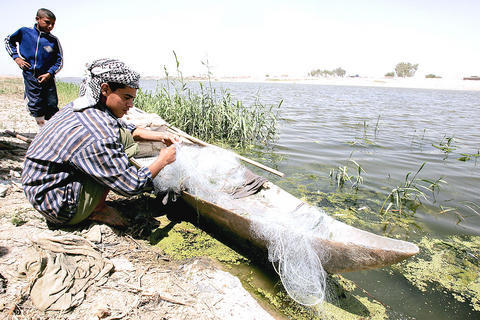For thousands of years fishermen have drawn their livelihoods out of the brown waters of the mighty Tigris and Euphrates rivers, which teem with species found nowhere else in the world.
But now -- as overlapping civil wars grip much of Iraq -- outlaws equipped with pesticides, hand grenades and electric cables are driving the country's fisheries to extinction and leaving local fishermen with empty nets.
"Iraq's fish are suffering from these terrible crimes," said Faiq Salim, one of the oldest fishermen in the central Iraqi town of Kut, 175km downriver from Baghdad.

PHOTO: AFP
"Fishermen are using poison and pesticides and electric cables and hand grenades," reminiscent of methods adopted by many Lebanese in the eastern Mediterranean during their 1975-1990 civil war, he complained.
"They are desperate for work, outside the law, and without any concern for their actions because of the absence of anyone policing them," added Salim, whose family has fished the Tigris river for generations.
Before the US-led invasion in 2003, Salim used to pull in 30 or 40 fish a day, but now says he is lucky to catch three.
"Fishermen today are no longer able to provide for their families because of these crimes against them," he said.
Kut's fishermen used to net 450 tonnes of fish a week, but in recent years that number has dwindled to less than 30 tonnes, according to statistics compiled by the agriculture ministry's local office.
While under Saddam Hussein's dictatorship, authorities brought the same heavy hand to bear on the fishing industry that they brought to everything else, requiring fishermen to carry licenses and providing them with officially approved nets.
Now, skyrocketing unemployment is driving more and more upstart fishmongers into the business and -- with local enforcement hamstrung by its war with militias and insurgents -- many ignore time-honored codes of conservation.
"These practices are against fishing laws," said Fadil Jaafari, another fisherman. "Many of these new fishermen deliberately fish during the high season between the middle of February and the beginning of April.
"But the professional fishermen don't fish during this season so that their livelihood will last after that period. They don't violate the law," he said.
Unchecked fishing has drained local stocks, leading many to wonder about the future of the industry. "What is happening now in front of the eyes of government officials is dangerous," said Hani Mohammed, a fish seller.
"These terrible practices are supplying huge amounts of fish to local markets and driving the fish to extinction," he added.
At the same time, overall demand for fish has plummeted amid reports that dozens of victims of the sectarian bloodletting in and around Baghdad are being dumped in the Tigris.
"The number of customers has gone way down, and many have given up eating fish because of the stories circulating that the fish eat rotting human flesh," said Muhanad Ali, another fishmonger. "Most people now prefer farmed fish."
Others worry about the possible health consequences of the new fishing methods, particularly the pesticides.
"If the government does not go after these outlaws that use poisons and explosives they will put the lives of thousands of people in danger," fisherman Ali Said said.
Until then, the fishmongers, like nearly everyone else in the largely ungoverned country, are appealing to local religious leaders to stem the chaos.

The Philippines yesterday said its coast guard would acquire 40 fast patrol craft from France, with plans to deploy some of them in disputed areas of the South China Sea. The deal is the “largest so far single purchase” in Manila’s ongoing effort to modernize its coast guard, with deliveries set to start in four years, Philippine Coast Guard Commandant Admiral Ronnie Gil Gavan told a news conference. He declined to provide specifications for the vessels, which Manila said would cost 25.8 billion pesos (US$440 million), to be funded by development aid from the French government. He said some of the vessels would

Hundreds of thousands of Guyana citizens living at home and abroad would receive a payout of about US$478 each after the country announced it was distributing its “mind-boggling” oil wealth. The grant of 100,000 Guyanese dollars would be available to any citizen of the South American country aged 18 and older with a valid passport or identification card. Guyanese citizens who normally live abroad would be eligible, but must be in Guyana to collect the payment. The payout was originally planned as a 200,000 Guyanese dollar grant for each household in the country, but was reframed after concerns that some citizens, including

Airlines in Australia, Hong Kong, India, Malaysia and Singapore yesterday canceled flights to and from the Indonesian island of Bali, after a nearby volcano catapulted an ash tower into the sky. Australia’s Jetstar, Qantas and Virgin Australia all grounded flights after Mount Lewotobi Laki-Laki on Flores island spewed a 9km tower a day earlier. Malaysia Airlines, AirAsia, India’s IndiGo and Singapore’s Scoot also listed flights as canceled. “Volcanic ash poses a significant threat to safe operations of the aircraft in the vicinity of volcanic clouds,” AirAsia said as it announced several cancelations. Multiple eruptions from the 1,703m twin-peaked volcano in

A plane bringing Israeli soccer supporters home from Amsterdam landed at Israel’s Ben Gurion airport on Friday after a night of violence that Israeli and Dutch officials condemned as “anti-Semitic.” Dutch police said 62 arrests were made in connection with the violence, which erupted after a UEFA Europa League soccer tie between Amsterdam club Ajax and Maccabi Tel Aviv. Israeli flag carrier El Al said it was sending six planes to the Netherlands to bring the fans home, after the first flight carrying evacuees landed on Friday afternoon, the Israeli Airports Authority said. Israeli Prime Minister Benjamin Netanyahu also ordered